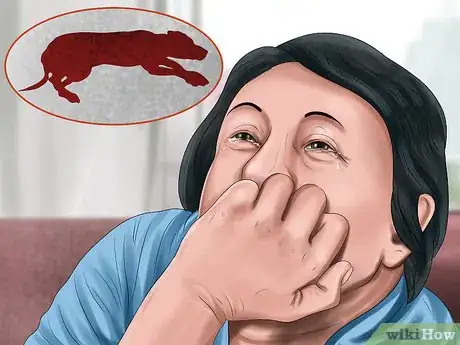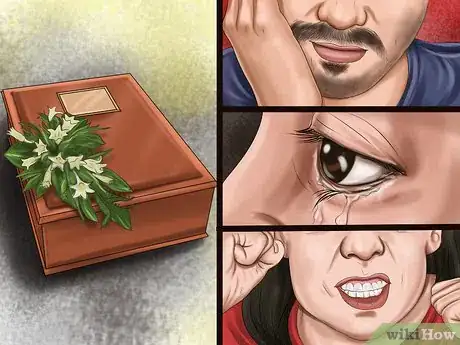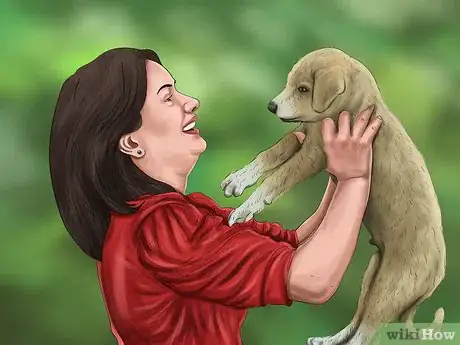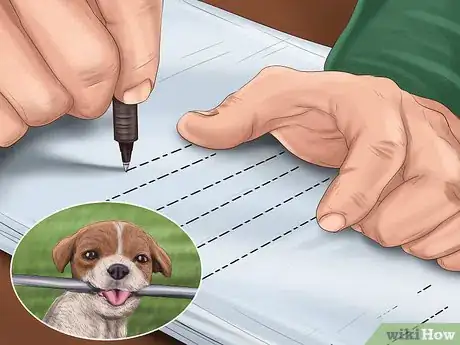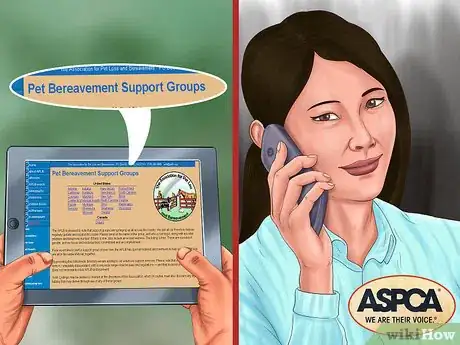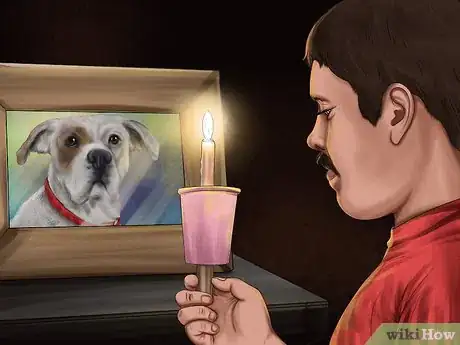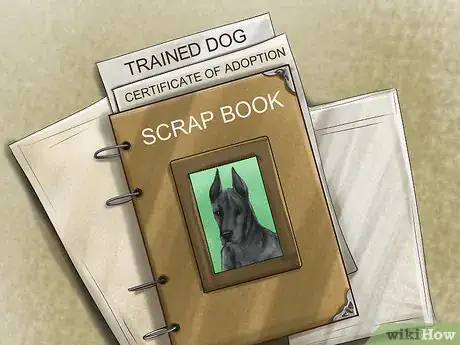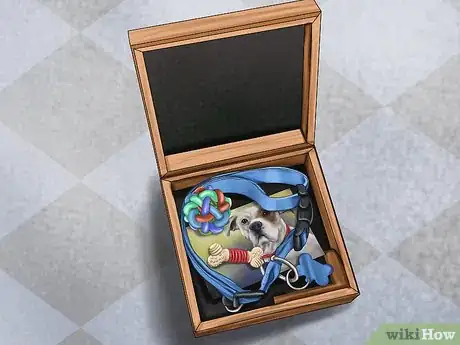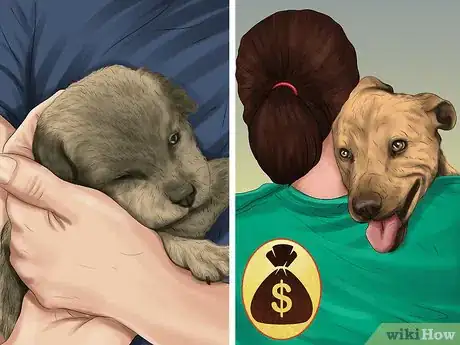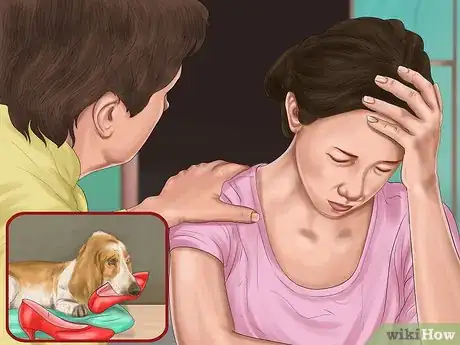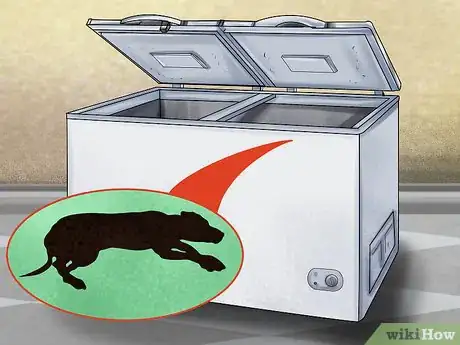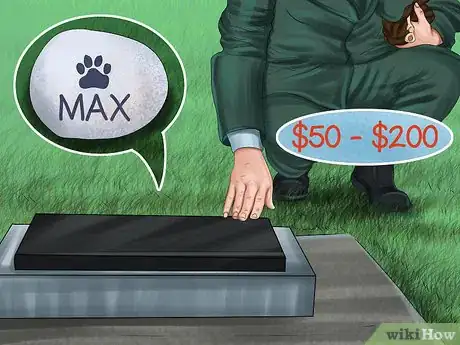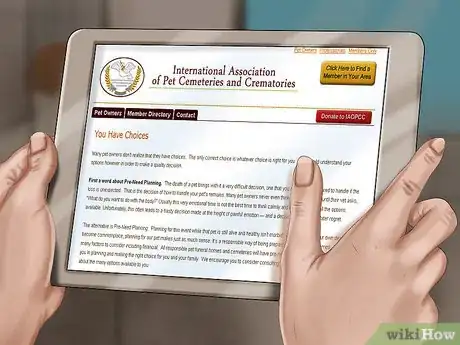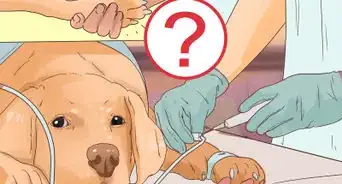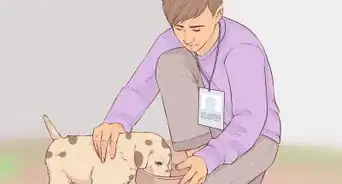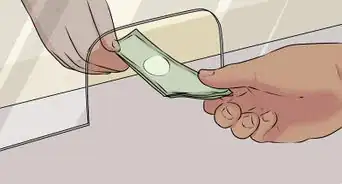This article was co-authored by William Gardner, PsyD. William Gardner, Psy.D. is a Clinical Psychologist in private practice located in San Francisco, CA’s financial district. With over 10 years of clinical experience, Dr. Gardner provides individually tailored psychotherapy for adults using cognitive behavioral techniques, to reduce symptoms and improve overall functioning. Dr. Gardner earned his PsyD from Stanford University in 2009, specializing in evidence-based practices. He then completed a post-doc fellowship at Kaiser Permanente.
There are 7 references cited in this article, which can be found at the bottom of the page.
This article has been viewed 47,880 times.
The death of a dog can be a difficult event to handle. For many people, their dog is like a family member and you may experience a sense of loss and go through the grieving process. You may also wonder how to handle practical matters or how to remember your pet. There are things you can do to make the death of a dog easier to cope with, however. First, focus on handling your grief. Then, remember your dog, and handle the remains.
Steps
Handling Your Grief
-
1Take time to grieve. Many times pets, especially dogs, become a meaningful part of your life. Although you may feel that you should only take a little bit of time to mourn the death of an animal, you should also remember that it’s okay to take as much time as you need to grieve over your companion. Take a day off from school or work if you need some time work through your feelings. You might tell your supervisor or teacher, “My dog died. We were really close. I know you may not understand, but I need to take a day to grieve.” Hopefully, they’re a dog lover and will understand.
- Don’t rush yourself through the grieving process. There is no time limit for mourning.
- Don’t shame yourself if it take you longer than expected to grieve. Don’t let other people shame you either.
-
2Understand the grieving process. Grieving is a process with multiple stages that range from denial, anger, bargaining, and depression, to acceptance.[1] When your dog dies, it’s normal for you to experience some or all of these stages.[2]
- For example, for a few day or weeks you may feel depressed when you think about the loss of your pet. This is a normal part of the grieving process.
- Let go of your expectations about how you thought the grieving process would be. You might be tearful for a while, or you might not cry at all. Allow the process to happen in a way that is natural for you.
- You may feel angry when you think about the loss. For example, it may make you angry that there was nothing you could do to save your dog.
- Depending on the relationship you had with your dog, you may experience denial. You may find it hard to accept that they are gone and keep expecting them to show up.
Advertisement -
3Think through major decisions. It’s never a good idea to make major decisions when you are upset, especially when you’re facing a loss. This includes decisions such as adopting a new dog or other pet. Although you may want to fill the void your dog has left, you should take some time to grieve and work through this loss first.
- Try fostering a dog if you think that you're ready to adopt again. This will give you a sense of whether you're ready to bring a dog into your life again and help a shelter dog.
-
4Try journaling. Writing about how you feel and what you are going through can be a good way to cope with the death of a dog.[3] Journaling gives you the chance to express yourself openly and honestly and work through all of the feelings you may be having about the death.
- Write about what happened. Writing about it can help you stop denying that it happened.
- Write about how you feel about the loss and how your feelings change over time. For example, you might write that at first you were angry, but now you accept the loss.
- Write about your memories of your dog. For example, you might write about when they were a puppy, how you found them, or the first time they went ‘fetch’.
-
5Turn to your support system. During times of loss, whether of a person or a dog, it’s a good to ask the people close to you for support. Ask your family and friends to help you handle your grief and work through the grieving process and consider reaching out to others who have been through the same thing.[4]
- Ask someone to come be with you. You don’t have to do or say anything when they’re there. For example, you might say, “Mom, could you come over for a little while? I miss Daisy and just need someone to be here.”
- Keep in mind that people may make unsolicited comments. It is okay to let them know that you are not looking for advice, and that you just need someone to listen and distract you from your grief.
-
6Join a pet loss support group. Spending time with other people who have experienced the loss of a dog can help you cope with your dog’s death in several ways. It can help you feel connected, provide you with strategies for handling your feelings, and offer you encouragement. Consider joining a support group in your area or an online group or forum.
- You can search for groups in your area on the Association for Pet Loss and Bereavement webpage at https://aplb.org/support/groups/
- Call the ASPCA Pet Loss Hotline at 1-877-474-3310 to find support resources near you.
- Contact the Pet Loss Support Hotline offered by Tufts University Cummings School of Veterinary Medicine by calling 508-839-7966 or visiting http://vet.tufts.edu/petloss/.
-
7Seek professional help if your feelings escalate. Sometimes feelings of grief can escalate and turn into depression, and you will need to seek help for yourself if this happens. When you are grieving, it is normal to have difficulty sleeping, loss of appetite, and general sadness. However, if you begin to feel suicidal, lose a noticeable amount of weight, or have trouble going about your day, then you should talk to a medical or psychiatric professional for help.[5]
Remembering Your Dog
-
1Hold a memorial service.Having a ceremony or service will give you the chance to remember and celebrate the life of your dog. It can also serve as the time that you take care of the remains.[6] Your memorial service can be as private, or as public, as you like, but it should be meaningful to you in order to help you cope with your loss.
- If you would like to share this time with others, invite people close to who had a chance to spend time with or meet your dog.
- You may want to display pictures of some of your times together or light a candle in honor of your dog.
- You can also say a few words, play a song, or recall a memory that reminds you of your dog. Do what feels appropriate and meaningful to you.
- You can hold this ceremony each year on the dog’s birthday, adoption anniversary, or anniversary of their death.
-
2Preserve your memories. It’s likely that there are a lot of large and small things about your dog that you’ll want to remember. It may be difficult for you to do now, but taking the time to gather and store some of your dog’s favorite objects and things that remind you of your dog can help you cope with your loss. Although you may not want to keep everything, save a few items to help preserve your memory of your dog.[7]
- If it is too upsetting for you to do this right now, then you could also ask a friend or family member to do it for you. They can dispose of these things for you in the way that you specify, or you can simply ask them to hold onto these things until you are ready to deal with them yourself.
-
3Put together a scrapbook. An album, photo collage, or scrapbook of items related to your dog is one way you can preserve their memory. Include pictures, vet reports, adoption papers, training certificates, and other things that help you remember your dog.
- Use the time you spend collecting items for the project to reflect on the memories you have with your dog.
- Consider making an online scrapbook, webpage, or blog about your dog as an alternative or supplement to a hard copy.
-
4Create a memory box. This is an excellent way to preserve some of your dog’s items that won’t fit in a scrapbook. You might include favorite toys, photos you have of the two of you, their collar, and other things that give you fond memories of them. You can look through the box any time you want to remember your dog.
- Decorate the box with dog-themed pictures, stickers, or other art that makes you think of your dog.
- If you have an annual ceremony to remember your dog, you can use some of the items from the memory box at the ceremony.
-
5Help other dogs. Although you may not want or need to go out and adopt a new dog, doing things to help other dogs is one way to cope with your grief and remember your own dog.[8] Consider making a donation to an animal rescue or rights organization in your dog’s name. Or, you may want to volunteer at an animal shelter or clinic in your area.
-
6Allow others to remember and share. In some cases, your dog might have been a significant part of other people’s lives as well. Give these people the time, space, and respect the need to grieve and memorialize your dog as well.[9]
- For example, respect it if your partner doesn’t want to throw away the old shoe that your dog used to chew up. It may have sentimental value for your partner.
- Or, for instance, allow your children to remember your dog in their way, even if it doesn’t make sense to you.
Taking Care of the Remains
-
1Contact your veterinarian. Depending on the situation, your vet may already be aware that there is a problem and may have already given you instruction for handling the remains. If you haven’t contacted your vet, however, you should do so because they can help give you specific instructions on how to humanely take care of the remains.[10]
- If you would like the body examined to determine cause of death, you should definitely contact your vet to determine the best way to store the body if it can’t be picked up or delivered immediately.
-
2Storing the body short term. You may need to store the body for a few hours or even a day as you work out how you will handle the remains. Take care to store the body in a way that keeps it cool and dry.[11]
- If possible, store it in a plastic bag or sheet in a freezer.
- If it can’t fit in a freezer, try to store it uncovered on concrete.
- Choose a place where children and other people who might be easily upset won’t see the body.
-
3Consider cremation. Many dog owners consider cremation when deciding what to do with the remains of their deceased pet.[12] This option allows you to keep some of the remains in memorial or to scatter it in a favorite place your dog loved. It’s also a viable option for people that don’t have land for a private burial or don’t want to have a public burial. There are many cremation options ranging in price from $50 - $200.[13]
-
4Think about burial as an option.If you have private land or if there is a pet cemetery in your area, you may want to consider burial as a way to handle the remains.[14] Burying your dog gives you the chance to visit them and makes it possible for other people to mourn your dog in the future as well.
- You can get information about burial options and arrangements at a pet cemetery near you by visiting the International Association of Pet Cemeteries and Crematories at https://www.iaopc.com/pet-owners/you-have-choices.
- You can visit the Veterinary Compliance Assistance at http://www.vetca.org/lacd/index.cfm to get information about the requirements and regulations for a private burial.
Expert Q&A
-
QuestionWhy does losing a dog hurt so much?
 William Gardner, PsyDWilliam Gardner, Psy.D. is a Clinical Psychologist in private practice located in San Francisco, CA’s financial district. With over 10 years of clinical experience, Dr. Gardner provides individually tailored psychotherapy for adults using cognitive behavioral techniques, to reduce symptoms and improve overall functioning. Dr. Gardner earned his PsyD from Stanford University in 2009, specializing in evidence-based practices. He then completed a post-doc fellowship at Kaiser Permanente.
William Gardner, PsyDWilliam Gardner, Psy.D. is a Clinical Psychologist in private practice located in San Francisco, CA’s financial district. With over 10 years of clinical experience, Dr. Gardner provides individually tailored psychotherapy for adults using cognitive behavioral techniques, to reduce symptoms and improve overall functioning. Dr. Gardner earned his PsyD from Stanford University in 2009, specializing in evidence-based practices. He then completed a post-doc fellowship at Kaiser Permanente.
Clinical Psychologist Pets are a meaningful part of your life, so losing your dog causes grief, just like any other loss. Take as much time as you need to mourn your dog and accept any and all emotions that you experience as you go through the grieving process.
Pets are a meaningful part of your life, so losing your dog causes grief, just like any other loss. Take as much time as you need to mourn your dog and accept any and all emotions that you experience as you go through the grieving process.
Warnings
- If you find that you are having a difficult time coping with the death of your dog, consider seeking professional help. The death of a dog can cause depression the same as any other loss.⧼thumbs_response⧽
References
- ↑ William Gardner, PsyD. Clinical Psychologist. Expert Interview. 25 July 2019.
- ↑ https://www.caninejournal.com/how-to-deal-with-the-death-of-dog/
- ↑ http://www.humanesociety.org/animals/resources/tips/coping_with_pet_death.html
- ↑ http://www.helpguide.org/articles/grief-loss/coping-with-pet-loss.htm
- ↑ https://www.psychologytoday.com/blog/the-new-grief/201203/when-does-grief-become-depression
- ↑ https://www.caninejournal.com/how-to-deal-with-the-death-of-dog/
- ↑ http://www.helpguide.org/articles/grief-loss/coping-with-pet-loss.htm
- ↑ https://www.caninejournal.com/how-to-deal-with-the-death-of-dog/
- ↑ http://www.humanesociety.org/animals/resources/tips/coping_with_pet_death.html
About This Article
The death of a dog can be difficult to process and there is no correct way to grieve, but there are many things you can do to make things easier. For example, consider holding a memorial service, where you light candles and talk about your dog, to honour its memory and say goodbye. You should also try to spend time with others, since connecting with other people can take your mind off your loss. When you find yourself getting overwhelmed by emotions, consider writing down your thoughts in a journal to help you process them. If you feel like your friends and family don’t understand your suffering, consider joining a pet loss support group or talking to a therapist to work through your feelings. For more tips from our Counselling co-author, including how to remember your dog by making a scrapbook or memory box, read on!
